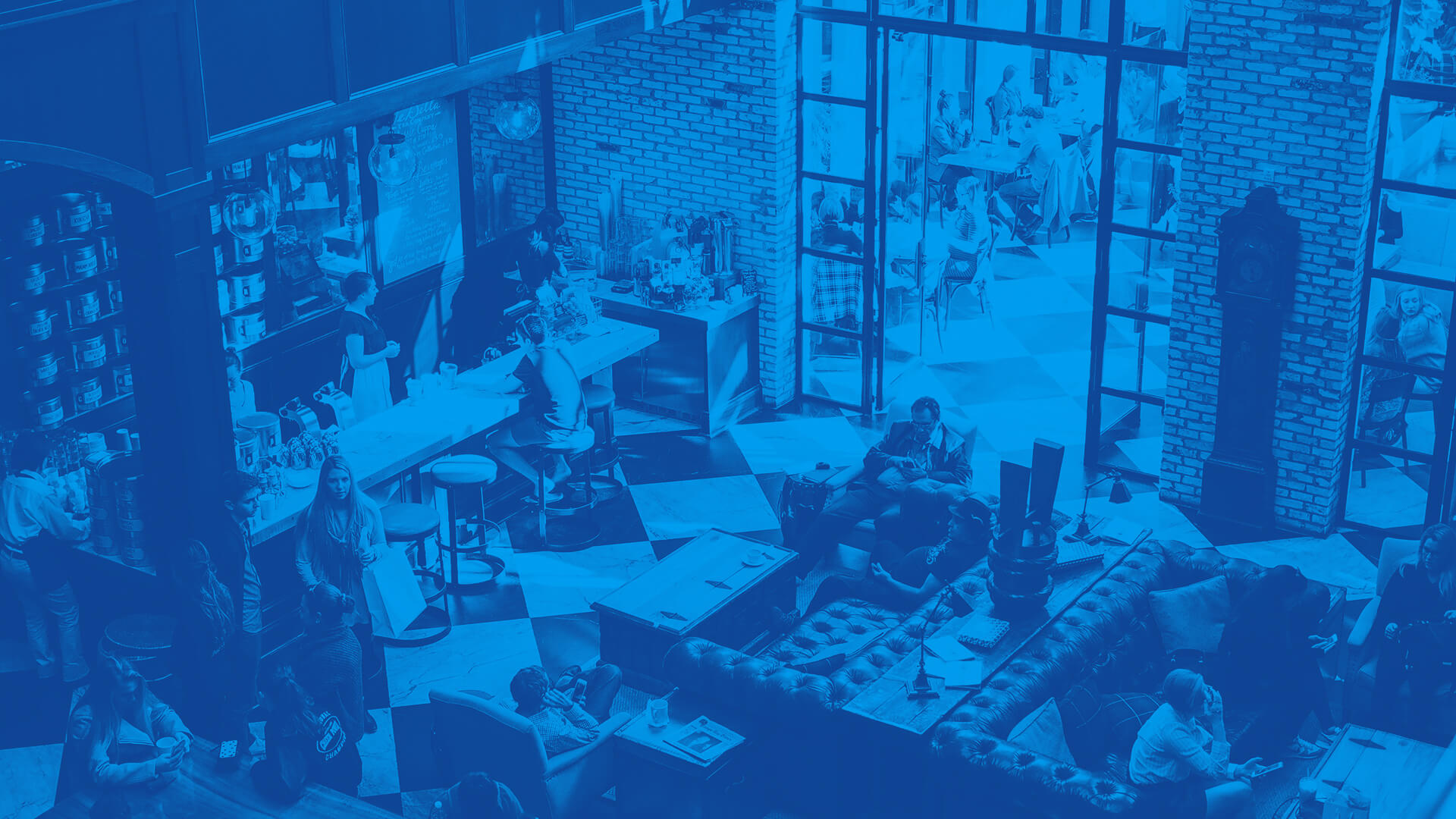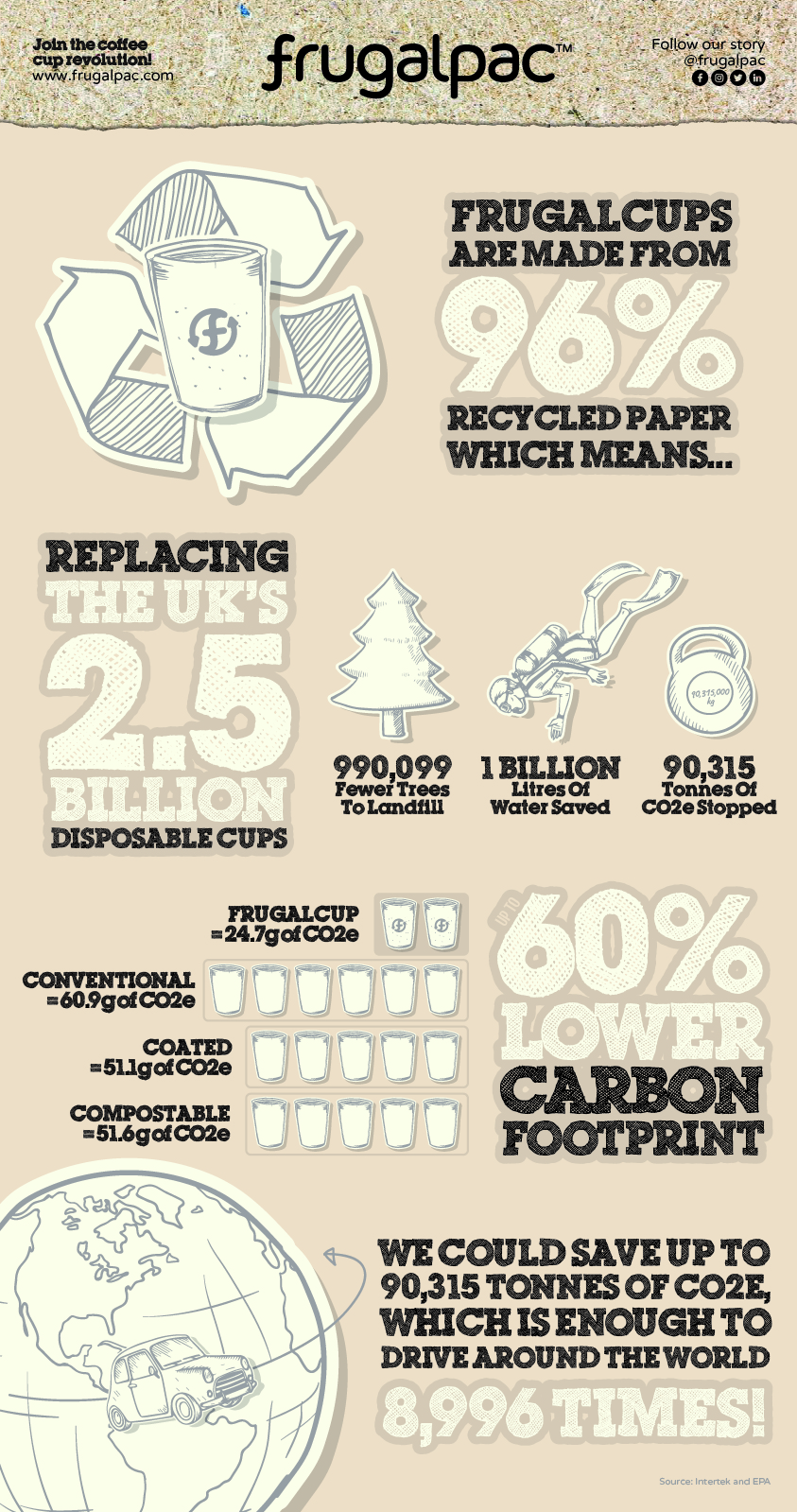A ground-breaking new study released on Earth Day (April 22) reveals the world’s first recyclable coffee cup made from recycled paper, the British-made Frugal Cup, has a carbon footprint up to 60% lower and a water footprint up to 74% lower than conventional and compostable cups that would globally save up to 200 million trees and 215 billion litres of water a year.
The independent Life Cycle Assessment (LCA) analysis by Intertek, one of the world’s leading Total Quality Assurance providers, is the first to measure the environmental impact of producing, using and disposing of all types of single use coffee cups, including the whole supply chain from growing trees, paper-making, plastic production, transport, cup and sleeve manufacture, delivery, and waste processing.
It found that each conventional single use coffee cup requires 0.58 litres of water to produce and has a carbon footprint of up to 60.9 grams of CO2e per cup. That’s because conventional, coated and compostable cups are all made from virgin paper.
That means we use up to 1.45 billion litres of water and 1.03 million trees to produce more than 2.5 billion coffee cups used in the UK every year and 290 billion litres and 206.3 million trees to make the estimated 500 billion cups used globally.
The carbon footprint of the 2.5 billion cups that go to landfill in the UK is therefore over 152,000 tonnes of CO2e, the equivalent of 33,300 cars being driven for a year. Globally for the 500 billion cups, that’s over 30.4 million tonnes, the CO2 equivalent of providing electricity to 5,155,366 households – a city the size of Paris.
But if the UK moved over to the Frugal Cup, which is made from 96% recycled paper with no waterproofing chemicals, it could save over a billion litres of water and up to a million trees a year. Repeated globally, we could save 215 billion litres of water and 198 million trees a year.
The analysis shows that if Frugal Cups replaced the more than 2.5 billion coffee cups used in the UK every year, the carbon saving would be approximately 90,315 tonnes of CO2e, which is the carbon equivalent of:
- Driving more than 224 million miles in an average car. Enough to drive around the world 8,996 times and take 19,502 cars off the road
- Charging 11.5 billion smartphones. More than enough to charge every smartphone on the planet three times
- Sequestering carbon from 117,947 acres of forest – the size of 68,300 football pitches
- Providing electricity for 15,291 homes for a year – the size of a town like Port Talbot.
Source:EPA
If the 500 billion paper cups consumed globally were replaced with Frugal Cup, we could save more than 18 million tonnes of CO2e, which would be the carbon equivalent of 42 million barrels of oil, driving around the world 1.8 million times or providing electricity to 3,058,173 households for a year – more than enough to power whole countries like Scotland, Denmark or Finland.
Replacing the UK’s more than 2.5 billion cups with Frugal Cup could also save 1.07 billion litres of water every year, the equivalent of 400 Olympic-sized swimming pools, and more than 990,099 trees. (This figure is based on 2006 US statistics that found 6.6 million trees were cut down to produce 16 billion paper coffee cups, therefore averaging 2,424 paper cups per tree and the Frugal Cup being made of 96% recycled paper).
Source: Environmental Defence Fund and PaperCalculator.org
Therefore, if the 500 billion paper cups used globally annually were replaced with Frugal Cup, we could save 215 billion litres of water and 198 million trees every year.
The LCA study shows how the Frugal Cup beat conventional, coated, and compostable cups in each environmental criterion and disposal method – recycling, incineration and landfill.
It found:
- Conventional cups had the highest carbon footprint when sent to landfill or incinerated
- Compostable cups had both the highest carbon footprint if recycled and the highest water footprint to make each cup.
- The Frugal Cup had the lowest carbon and water footprints across all categories.
The Intertek Coffee Cup LCA study reveals:
- If all cups are sent to landfill – as the vast majority are – the conventional cup has the highest carbon footprint of 60.9 grams of CO2e followed by 51.6 for compostable, 51.1 for coated and just 24.7 for the Frugal Cup.
That means the Frugal Cup has a carbon footprint up to 60% lower than conventional cups, 52% lower than compostable and 51% lower than coated.
- If all the cups are recycled – and there is only one dedicated plant in the UK that can process them and two other sites that can recycle in a controlled environment – the compostable cup has the highest carbon footprint with 31.7 grams of CO2e followed by conventional with 31.5, coated with 31.0 and the Frugal Cup the lowest with 22.4.
That means the Frugal Cup has a carbon footprint 30% lower than compostable and conventional and 27% lower than coated.
- If all the cups are incinerated, the conventional cup has the highest carbon footprint with 33.1 grams of CO2e compared to 31.9 for coated, 31.5 for compostable and just 26.2 for the Frugal Cup.
That means the Frugal Cup has a carbon footprint 21% lower than conventional cups, 18% lower than coated and 17% lower than compostable.
- The Frugal Cup has the lowest water footprint, requiring just 0.15 litres to produce a cup.
That means the Frugal Cup uses 74% less water than compostable cups (0.58), 72% less than conventional (0.54) and 62% less than coated (0.41).
Intertek concludes in its 21-page study: “The Frugal Cup has the lowest environmental impacts under every life cycle scenario and by every environmental measure.
“This is because the Frugal Cup closes the loop by incorporating a high proportion of recycled content and it is more efficiently recycled.”
Ipswich-based sustainable packaging firm Frugalpac developed the Frugal Cup in response to the worldwide debate on the difficulty of recycling takeaway coffee cups.
…
In 2017, the UK’s House of Commons Environmental Audit Committee ‘Disposable Packaging Coffee Cups’ report found that only one in 400 cups actually get recycled with the vast majority of the more than 2.5 billion coffee cups consumed each year in the country going straight to landfill.
That’s because in the UK there is only one dedicated recycling plant and 53 industrial composting facilities that could process coffee cups.
But unlike conventional, compostable and cups that use virgin paperboard and PE (Polyethylene) or PLA (Polylactic acid) linings, 96% of the Frugal Cup is made from recycled paper with the remaining 4% a PE (Polyethylene) food grade liner.
The construction of the Frugal Cup allows ease of recycling again. This means it is the only coffee cup that can get recycled through standard recycling facilities across the UK.
The Environmental Audit Committee recommended that the Government set a target that all single use coffee cups disposed of in recycling bins should be recycled by 2023 and the industry should agree on the design of a disposable cup which can be easily recycled.
Frugalpac’s Chief Executive Malcolm Waugh said:
“This independent study conclusively proves that the Frugal Cup is the most environmentally friendly paper cup available and could easily become the standard if the major coffee chains accepted it.
“It’s the only cup that uses recycled paper and whichever way you dispose of it, still produces by far the lowest carbon and water footprints against conventional, coated and compostable cups.
“It’s increasingly clear that people and businesses have to live and work more sustainably. Recycling coffee cups is still a huge problem. There is only one dedicated waste facility in the UK to process conventional cups and 53 industrial composting sites that could process compostable cups. Increasing that capacity will cost tens of millions of pounds and take decades to achieve.
“The Frugal Cup has been specifically designed to go through conventional recycling facilities. Moving over to our cup will protect the environment, reduce carbon emissions, save billions of litres of water and stop millions of trees needlessly being cut down to produce single use cups made of virgin paper.”
The Frugal Cup is already being used in independent coffee shops across the UK and in universities such as the prestigious London School of Economics.
Marcelo Warmling, Hospitality & Catering Manager at the London School of Economics, said:
“Standard virgin paper cups with a plastic liner are extremely difficult to collect, sort, and recycle because of their components and construction. That’s why we decided to stock the Frugal Cup across all our catering outlets.
“Manufactured in UK – using a market-leading 96% recycled paper and no waterproofing chemicals – the Frugal Cup delivers considerable reductions in the use of energy and carbon. With such impressive Life Cycle Analysis results, the Frugal Cup was the only choice for us. Plus, as it is manufactured using recycled paper, it has already completed several loops of recycling prior to it becoming a cup, which means that the process is truly circular.
Further Frugalpac products due to be commercially launched in the next few months include a Frugal Bottle for wine and spirits and a Frugal Pot for ice cream, yoghurt, porridge and noodles.

